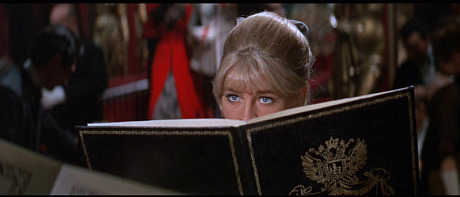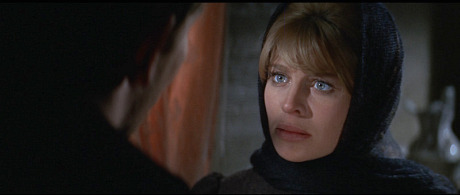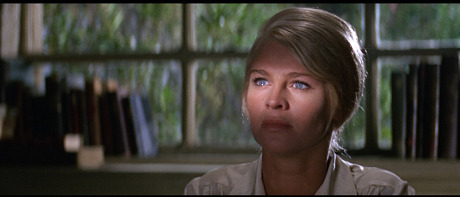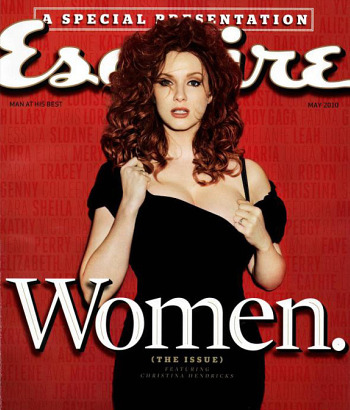Yesterday the Daily Beast‘s Eric Pape reported that French President Nicolas Sarkozy “hand-delivered a letter from fugitive Oscar-winning filmmaker Roman Polanski last week to President Barack Obama on the sidelines of the international anti-nuke proliferation summit in Washington, according to a small and little-noticed article embedded in the prestigious French political magazine, L’Express.” I’m a Polanski forgiver, but if I were Obama I wouldn’t touch this one with a 20-foot pole.
Day: April 20, 2010
Eyes That Enslave
These captures of Julie Christie (taken from DVD Beaver’s 4.19 review of the Dr. Zhivago Bluray) prove that director David Lean and cinematographer Freddie Young were madly in love with her blue eyes. What 21st Century films offer evidence of a director being similarly enthralled?



Voynar Wrongo
In a defense of Kick-Ass and a jab at critics who’ve expressed distaste at the homicidal violence practiced by Chloe Moretz‘s Hit Girl, MCN’s Kim Voynar uses the old “what are ya squawkin’ about, this is just a movie” argument, which is a bullshit ploy.
Kick-Ass “isn’t real life [and] the people who ‘die’ in the film aren’t really dead, anymore than they are when Batman or Spider-Man take a bad guy down,” she says. “[And] Moretz doesn’t kill anyone any more than Jodie Foster really had sex with the adult men who wanted to have sex with a child prostitute in Taxi Driver or Brooke Shields really had her virginity auctioned off in Pretty Baby.
“Kick-Ass is a comic book movie and a satire,” Voynar writes, “and the scenes with Hit-Girl, more than any other aspect of the film, make that clearly apparent.”
Maybe, but there’s a huge difference between a movie that is a satire and one that announces that it’s a satire in relentlessly broad terms, over and over and over. Satire that walks the walk is far better than one that mostly puts on airs and talks the talk.
Kick-Ass is of the second category, of course, and part of the thinking that goes along with “announced” satire, apparently, is that you don’t have to portray anything in the film as even remotely relatable to reality. You can make up your own dumb rules and do anything you want because you’re doing “satire,” which is presumed (in the minds of the filmmakers, I mean) to be a phony-baloney bullshit cartoon.
It’s apparently never occured to Kick-Ass director Matthew Vaughn and his ilk that a movie can be a satire and yet not feel compelled to tap moviegoers on the shoulder every other minute and say “you guys understand that we’re just kidding around in order to make a point, right?” That a satire, in other words, can actually invest itself in a semblance of reality, at least to the extent that it’s a little easier for audience members to roll with the elements (plot, characters, action) so it can sink in on some level.
Most moviegoers, I suspect, are kinda looking for most movies that are supposed to be “about” something to keep at least one foot on the ground — to not go completely off the rails. As Dr. Strangelove or The Hospital did, for instance.
This is why people are taking Moretz’s Hit Girl half seriously. Because it’s hard if not impossible to feel anything for a young girl who’s intended to be a complete jape, and so they’re stepping in and making her “real” in their heads at least. And because films that insist on a total disconnect from even a semblance of reality tend to be shitty to start with. “It’s just a satire” is a mediocre rationale, an easy way out.
Oh, and in my head? Jodie Foster was a little prostitute in Martin Scorsese‘s Taxi Driver — as far as I was able to suspend my disbelief, I mean — and so was Brooke Shields in Louis Malle‘s Pretty Baby.
Dreading of Rockwell
The admiration that Steven Spielberg and George Lucas have for Norman Rockwell, that legendary painter of long-gone, dead-and-buried Americana, is being officially acknowledged with a Smithsonian exhibition called “Telling Stories: Normal Rockman from the Collections of George Lucas and Steven Spielberg,” which will run for six months (7.2.10 through 1.2.11).

When I first read about this on Carrie Rickey‘s Philadelphia Inquirer blog I was reminded that the Rockman-esque influence is one of the biggest reasons why I despise Spielberg these days — i.e., because his films have been offering allusion after allusion and tribute after tribute to that sentimental notion of small-town America that Rockwell’s paintings are more or less synonymous with. I for one have always found this aspect of Spielberg’s films to be treacly and un-genuine.
We’re talking about a vision of America that may have had some ties to actual 1950s culture (i.e., when Spielberg and Lucas grew up) but which really came out of the 1920s and ’30s, and had actually begun to die in the wake of World War II, primarily from the corporate tract-home construction and suburbanization of Middle America and the various ’50s be-bop influences (Ginsberg-Kerouac-Burroughs, rock ‘n’ roll, Little Richard, Elvis Presley‘s hips) that began to change the way Americans saw themselves and behaved.
I worship anyone who can portray the character of rural old-time American life without undue sentiment (as David Lynch did in The Straight Story ) but this has always been beneath Spielberg’s interest or abilities.
"Thanks For The Warning"
This 40-day-old Robin Hood trailer is nicely done in the sense that the ad guys don’t seem to be pandering to mouth-breathers. On top of which any trailer that isn’t too plot-specific always gets my vote. Why am I posting this? Visual accompaniment, I suppose, to the welcome news that Ridley Scott‘s film (Universal, 5.14) will screen domestically on Tuesday, May 4th — a week before it shows in Cannes on Wednesday, May 11th.
I have to say that this German-language trailer strikes as slightly cooler on some level than the English-language one. Probably for no other reason than the German.
"I Am An Online Critic"
N.Y. Times critic Manohla Dargis recently spoke with WOSU‘s Steve Paulson, in part about the generally tiresome expectation of reciting a plot in a film review, and about the market validity and reach of her reviews (and A.O. Scott‘s). Paulson gently hints that the Times‘ long history and strong assocation with print may lead some to think of she and Scott as “dinosaurs,” but Dargis sets him straight.
Fantasy Lining
There’s one good thing about MGM’s current lack of liquidity, which has resulted in the suspension of development on Bond 23 — i.e., the 007 film that would have have been directed by Sam Mendes — and has banished Guillermo del Toro and Peter Jackson‘s The Hobbitt into the realm of financial uncertainty.
The good thing is that it’s now at least faintly possible that The Hobbitt could be scrubbed. This would obviously force Del Toro, who’s been prearing to direct the two-part epic, to make something more personal and particular — i.e., something in the realm of Pan’s Labyrinth. The shit-canning of The Hobbitt isn’t likely, I realize. Jackson will probably find alternate financing. But I can dream.
“Part of the reason they’re announcing the suspension of Bond 23 is that it clears the way for necessary payments to talent and others to be dropped for the time being,” a friend remarks.
Hard Decisions
If you’re filing like me (six or eight or ten posts daily) it’s all you can do to keep up with the regular Cannes Film Festival screenings plus whatever odd market screening you’re able to slip into. (Not to mention the occasional parties and press luncheons.) So let’s say plainly what most people would rather not say, which is that most waterfront-covering journalists might be able to attend one or two Director’s Fortnight screenings at best, and that’s if they’re seriously military.

Ellen Barkin in Cam Archer’s Shit Year
Of the just-announced 2010 Director’s Fortnight showings, I’ll be making an effort to see Cam Archer‘s Shit Year. Beyond that I’m not sure. I’d like to happen upon something stunning or breathtaking but how do you pinpoint such films in advance? Every day Cannes is a dawn-to-midnight struggle against the clock — you can’t mosey around.
If I plenty of nostalgic kick-back time I’d want to see 80 year-old Frederik Wiseman‘s Boxing Gym and maybe Stephen Kijak‘s Stones In Exile (i.e., a promotional tie-in to the 5.18.10 release of the remastered Exile on Main Street, about the recording of that classic Rolling Stones album in the South of France in ’71). Does anyone know anything solid about any of the DF selections?
Number 12 Looks Like Hendricks
There’s a Christina Hendricks clone on the cover of the current Esquire, and also in a photo spread inside (or at least on esquire.com). I don’t know the cause — radical diet, plastic surgery, Photoshop — but she’s definitely not the actress I’ve seen in Mad Men. Her particularity has been chiselled and scrubbed down and made to seem less particular, more generic. She could be any hot-bod Maxim babe.

In a 1964 Twilight Zone episode called “Number 12 Looks Just Like You,” creator Rod Serling recited the following intro: “For want of a better estimate let’s call it the year 2000. At any rate imagine a time in the future in which science has developed the means of giving everyone the face and body he dreams of. It may not happen tomorrow, but it happens now — in the Twilight Zone.”
“But is that good?,” Collin Wilcox‘s Marilyn Cuberle asks Richard Long‘s Dr. Rex. “Being like everybody? I mean, isn’t that the same as being nobody?
To which Dr. Rex grins and says, “I think it’s time you tell me where you’re getting these radical ideas.”
Jangly
I don’t remember loading this onto my iTunes collection, but it played during my drive to Connecticut last weekend, and I was suddenly reminded how transporting rhythm guitar and drum back-up can be without vocals. I would kill to find a collection of good ’70s and ’80s rock tracks with the singing entirely gone — just straight-ass band chops.
Shake Weight
No excuse for posting this three days late. I meant to throw it up Sunday morning but something (I forget what) distracted and then it was gone. Watched this again today and it’s definitely mildly funny.
